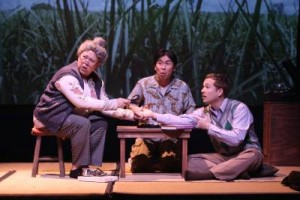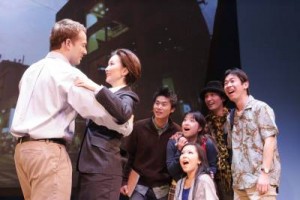RECOMMENDED
East West Players follows its superb productions of Julia Cho’s Durango and
Jeanne Sakata’s Dawn’s Light: The Journey of Gordon Hirabayashi with Jon
Shirata’s Voices From Okinawa.
Though not on a par with Cho’s intergenerational drama or Sakata’s look
back at WWII Japanese-American internment, Shirota’s TV movie-like
dramedy is nonetheless an entertaining and enlightening look at Japanese (or
rather Okinawan) culture and its effect on a young ¼ Japanese American
teaching English there.
Kama Hutchins, named after his great-grandfather, has journeyed to Japan in
search of his Uchinanchu (=Okinawan) roots. From his students, he learns
about contemporary Japanese youth; from Keiko Oshiro, the young and
attractive school principal, he learns about the rigidity of the Japanese
educational system; and from a distant relative (the elderly Obaa-san), he
learns about his family history.
Okinawa is hardly the modern, industrialized Japan that most people imagine
when they think of the country. Okinawans still farm sugar cane (fields of
which can be seen from Obaa-san’s house) and the influence of American GIs
is everywhere. Many of the young people are “bottle blonds,” and according
to Obaa-san, “even the cats and dogs are blond.” Many young Okinawan
women find employment as bar girls, something which caused Keiko
embarrassment and shame during her studies at U.C. Berkley whenever an ex-
GI asked her “Which bar did you work at?”
Japanese students are notoriously shy in class, something which Kama
attempts to remedy by encouraging them to talk about themselves in class.
Keiko is none too pleased about this deviation from school curriculum which
dictates that “proper English is made by repeating sentences over and over.”
She gives Kama one month to prove that his alternative teaching method
can yield results. Otherwise, he’s fired.
Kama’s methodology has varying degrees of success. His most talkative
student, the older Yasunobu, has no problem standing in front of his
classmates and telling about his life, though his fellow students seem a bit
uncomfortable about this garrulous GI barber who sticks out like a sore thumb.
Boyishly cute Takeshi talks about having been taken to Hawaii as a child by
General and Mrs. Hampton (he was their paperboy). They have invited the
teenager to join them in Indiana, and he is debating whether or not to make
the move.
Hipster Hitoshi and anime-voiced Harue are harder to persuade to speak in
front of the others, but they do eventually perform a comedy skit in tandem.
In it, Harue, playing Okinawan housewife “Aiko” tells her husband, “Today I
know only English. My name is Arice.” “Arice” works on a U.S. base, and wants
her hubby to behave more like an American. Since today is Valentine’s Day,
she wants chocolates, a wish that her traditional husband is loath to grant.
Last to speak is taciturn Namiye, whose shocking revelation of a degrading
encounter with an American GI provides Voice From Okinawa’s most intense
and dramatic moment.
Meanwhile, Obaa-san has informed Kama that because he is “oldest son of
oldest son,” her property is his now, prompting Kama to agree to lease the land
to the GI base. When Keiko learns of this, she is outraged. It will become yet
another place where bargirls are exploited. Not so, insists Kama, until Namiye’s
confession makes him reconsider his naiveté.
Will Kama retract his offer to the base? Will Obaa-san’s matchmaking efforts
to bring Keiko and him together be successful? Will Kama be allowed to
continue teaching at Keiko’s school? Will Kama return to the States or remain
in Okinawa?
One hardly needs Obaa-san’s psychic powers to answer the above questions.
Still, despite a certain lack of suspense, Voices From Okinawa remains a
charming and engaging slice of Okinawan life from a foreigner’s eyes, and is
blessed with a fine ensemble bringing Shirota’s cast of characters to life.
As Kama, West Virginian Korean-Irish-Cherokee-American Joseph Kim is a real
find. With his handsome leading man looks and boy-next-door charm, Kim
gives an ingratiating performance, informed by his own experiences living and
working in Korea, including a teaching stint similar to Kama’s. Hopefully,
casting directors will see this talented young actor’s viability in mainstream
productions.
Amy Hill proves herself once again one of East West Players’ brightest and
funniest gems as Obaa-san, who delights in doling out words of wisdom. In her
efforts to match Kama and Keiko, she advises him in her delightful “GI Engrish,”
“Don’t let her get overripe. Gather her in your arms and kiss her. Okinawan
girls like to be kissed. Only good thing they learned from Americans.” Hill milks
every line for what it’s worth and gets the shows biggest laughs.
Sachiko Hayashi shows the charm and femininity beneath Keiko’s rigid surface,
especially in a sweet scene in which she teaches Kama to foxtrot.
Like Hayashi, Atsushi Hirata, Teruko Kataoka, Taishi Mizuno, and Mari Ueda are
native Japanese, bringing authenticity to their roles as Kama’s students. (I’ve
been teaching ESL all my adult life and have had countless Japanese students
with the same blend of shyness and outrageousness that Shirota gives Kama’s
students in his script.) Ueda’s performance is especially memorable, her
shamed confession eliciting tears both from herself and from the audience.
Director Tim Dang deserves praise for keeping Voices From Okinawa reality
based, and the design team for making it look and sound so good. Hanging
from Mina Kinukawa’s set are American and Okinawan flags, a GI uniform,
and a traditional Okinawan outfit, all surrounding a projection screen used to
set scenes. Kinukawa designed the projections, which include sugar cane
fields, a photo of Kama’s great-grandfather (the original Kama), and
Japanese language variety show titles for Hitoshi and Harue’s skit. Soojin Lee’s
costumes include preppy sweaters, Hawaiian shirts, and native Okinawan
dress. Guido Girardi (lighting) and Dave Iwataki (sound) likewise do excellent
work.
After the power of Durango and Dawn’s Light: The Journey Of Gordon
Hirabayashi, some may find Voices From Okinawa lightweight fare. Personally,
though I understand and support East West Players’ mission to “give voice to
the Asian American experience,” I think that by featuring an outstanding
American play (like their acclaimed productions of Proof and Equus) in
addition to their yearly Broadway musical (Pippin is upcoming), they would be
able to a) attract a wider audience and b) offer Asian-American actors an
even greater variety of roles. Still, having taught ESL, learned Japanese, spent
time with Japanese students, and visited Japan, I found Voices From Okinawa
of special interest and fascination, and left the theater not only entertained
but having learned more about a part of Japan whose uniqueness stands out
in a country which is already quite unique.
David Henry Hwang Theater, 120 Judge John Aiso St., Los Angeles.
www.eastwestplayers.org
–Steven Stanley
February 13, 2008
Photos: Michael Lamont




 Since 2007, Steven Stanley's StageSceneLA.com has spotlighted the best in Southern California theater via reviews, interviews, and its annual StageSceneLA Scenies.
Since 2007, Steven Stanley's StageSceneLA.com has spotlighted the best in Southern California theater via reviews, interviews, and its annual StageSceneLA Scenies.







 COPYRIGHT 2024 STEVEN STANLEY :: DESIGN BY
COPYRIGHT 2024 STEVEN STANLEY :: DESIGN BY